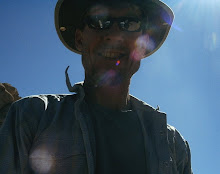I realized after the last post that I hadn't really finished at a place I was satisfied with. I was trying to say that I'm both frustrated with tired and backwards thinking regarding consumerism, and hopeful that a sea change is occurring in how we move forward. It seems like common sense to me that the foundation of our suddenly collapsing economy was built on sand. Steady growth fed by credit and consumerism worked for 50 years, but was not sustainable indefinitely. In Deep Economy, Bill McKibben explains why when he points out that economic growth is bumping up against its limits because of climate change and peak oil (which supplies both the main ingredient as well as the chief source of power in most manufacturing.) He points out three central challenges to the belief that the economy must continue to expand in order to remain healthy.
First, there's now plenty of data to show that - despite what business leaders and official say - growth is producing more inequality than prosperity. A very few have been getting very wealthy, while the majority have seen their incomes fall (when adjusted for inflation.)
Second, the energy resources simply don't exist to support the current rates of growth.
Third, growth and "prosperity" is not making us happier. To the contrary, nearly every study measuring general life satisfaction shows otherwise.
So if the growth model is broken, what are we left with?
I'm with McKibben in believing that what we want and need is community. That word is vague enough that there's a danger of it sounding Utopian. What I mean is that we must learn to see buying and spending as the relationship commitments they are. All spending is a kind of investment. If I buy a meal at McDonalds, I have made a small investment in that company; I have cast a vote in support of how they raise and slaughter meat, prepare the meal, take care of their employees, and dispose of their waste - all of it. Of course, If I choose instead to spend my money at The Country Cat, the meal will almost certainly cost me more money. But I will have invested in a local business that I know prepares meals from animals and crops raised locally and sustainably. I can be confident my money is an investment in the livelihood of people I know who are part of my local community and who are making a living wage. As McKibben says, this type of spending will yield less stuff but richer relationships. He calls this "The Durable Future."
What do you think? I'm really curious to hear how the current economy is affecting people, and how others are dealing with the tension between cutting back and trying to support local businesses.
Subscribe to:
Post Comments (Atom)




Hi -- found your blog through the Large Fella.
ReplyDeleteAbout a year ago (before things really started to tank) my girlfriend and I decided we would take leaves from our jobs in the city and tour around to work on organic farms. In exchange for room, board and an education in small farming, we would trade our labour and modest skills.
To be honest, we saw it coming. That doesn't make it any less scary, but the timing sure does feel right.
We want to come out of the year with a clearer vision of how we're going to pursue our own durable future. If you want to follow along, we're at http://heliotropes.wordpress.com
I love the Merlyn quote. Thanks for that!